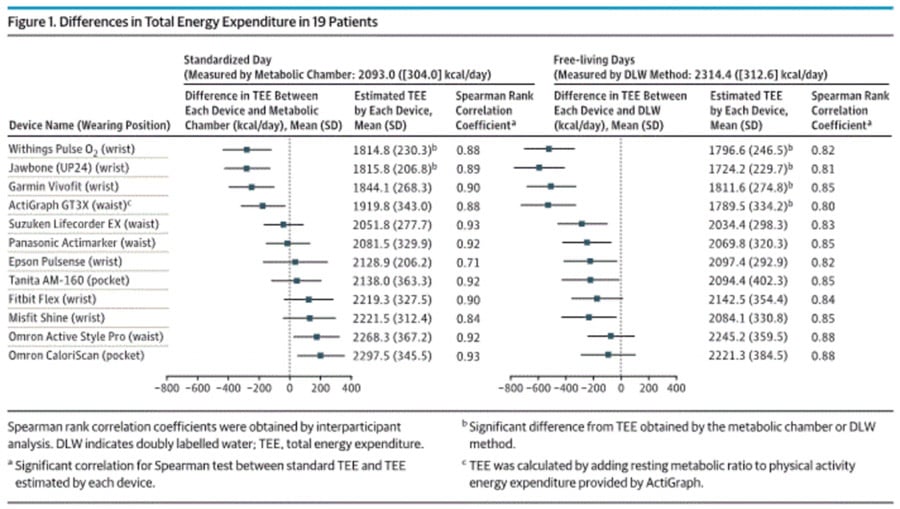Popular fitness trackers may not be the best way to track calories, according to a study recently published in JAMA Internal Medicine, which found that many leading fitness trackers have a margin of error of about 200 calories per day in either direction.
Conducted by Japanese researchers led by Haruka Murakami (not to be confused with the famous writer) from the National Institute of Health and Nutrition in Tokyo, the small study involved 19 participants, aged 21 to 50, who wore 12 fitness trackers a piece, including both popular consumer devices (Fitbit Flex, Jawbone UP24, Misfit Shine, Epson Pulsense PS-100, Garmin Vivofit, Tanita AM-160, Omron CalorieScan HJA-403C, and Withings Pulse O2) and medical devices (Panasonic Actimarker EW 4800, Suzuken Lifecorder EX, Omron Active style Pro HJA-350IT, and ActiGraph GT3X).
The readings from these devices were compared to two more robust ways of tracking calories: 1) a metabolic chamber where scientists could track oxygen consumption and carbon dioxide production, and assess calorie expenditure from that; and 2) urine samples which were used to calculate participants’ calorie expenditures in their normal lives.
To the wearables defense, researchers noted that participants couldn’t wear the trackers all the time.Compared to the metabolic chamber test, the Withings and Jawbone devices underestimated expenditure by about 270 calories while Omron devices overestimated calories by about 200 calories. Other devices all fell in between that range, while Panasonic and Epson products were closest to the standard.
In the urine test all devices underestimated calorie output, by margins ranging from 69 calories short (Omron Active Style Pro) to 590 calories short (Jawbone UP24).
To the wearables defense, researchers noted that participants couldn’t wear the trackers all the time. Also, they added that the test included only a healthy weight population, and that future studies should include overweight participants as well.
“Use of health-related apps may pose little risk in healthy persons if the information collected is not used for medical decision-making, but these apps should still undergo basic testing for accuracy,” Dr. Adam Schoenfeld, an internist at UCSF, wrote about in an accompanying commentary. “For mHealth apps that are designed to play a role in medical care, documenting the validity and accuracy of measurements is crucial.”
[Via: mobihealthnews]
